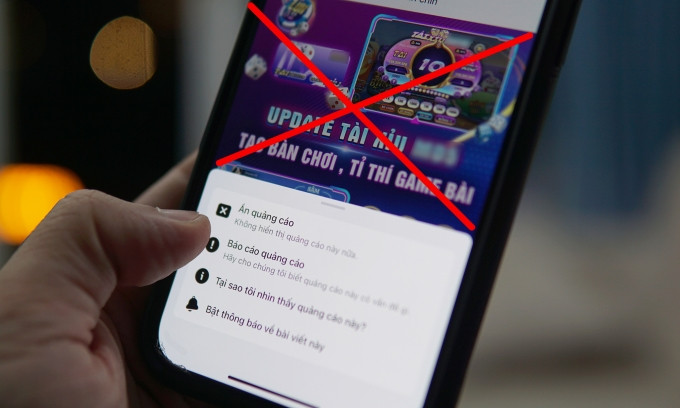Despite violating platform policies, a series of gambling, stimulant, and pornographic ads still passed Facebook's censorship system.
Duc Thanh, a construction engineer in Hanoi, said he often comes across content about gambling games, selling addictive substances... labeled "sponsored" every time he browses the news feed or watches Reels on Facebook. They appear in the form of livestreams, pre-recorded videos or articles. He has repeatedly selected the hide function and reported violations, but to no avail.
According to Ta Dinh Hieu, a social network service provider, advertisers always have ways to bypass automatic censorship tools.

Gambling game ads appear on Facebook. Photo: Luu Quy
He said that individuals or groups running advertising campaigns often buy or rent high-reputation accounts to increase the likelihood of their content being approved by the platform. Then, they intentionally write content with misspellings, add special characters like #, dots... or combine English and Vietnamese to avoid scanners. In addition, they also write letters incorrectly, such as replacing i with j, h with k, g with q.
"When livestreaming to advertise infringing items, sellers often redirect buyers to Telegram to make transactions," Dinh Hieu said. "As soon as the livestream ends, the advertisement will be taken down to erase traces and avoid Facebook's scanning tools."
According to Meta, they have advertising policies in place to ensure that content appearing on the platform is non-infringing and does not link to illegal content. Ads are reviewed to ensure compliance with the Advertising Policies before they appear on Facebook or Instagram.
However, in response to reporters, a Meta representative said: "In many cases, ads use technology to display content to the review system differently than they display to everyone, a method called cloaking. We are working to detect these actions and update our systems to prevent inappropriate ads."
Social networks also incorporate negative user feedback (like reporting, hiding, or blocking ads) into the review process. This helps improve automated systems that can identify bad content before it gets posted.
Besides the advertisers' censorship avoidance tricks, according to Mr. Hieu, Facebook itself has recently been "more relaxed when reviewing dark content".
In a mid-March survey by reporters, 96% of respondents said they had seen offensive gambling ads on Facebook. Only 4% said they had not been bothered. Nguyen Viet Anh, who specializes in providing cross-platform advertising services, said the situation was even increasing after the widespread sweep of social networks in April.
"Facebook often conducts random scans to remove violating content. But often, right after each scan, dirty ads tend to increase because the parties 'take advantage' of the time before the next scan," said Viet Anh.
At a meeting of the Ministry of Information and Communications on April 6, Mr. Le Quang Tu Do, Director of the Department of Radio, Television and Electronic Information, said that toxic content appeared not only on TikTok but also on other platforms such as Facebook and YouTube. Some accounts also took advantage of Facebook Reels to spread fake news, vulgar images, and advertise gambling games and drugs of unknown origin.
The Ministry of Information and Communications said it has coordinated with relevant ministries and sectors to request cross-border platforms such as TikTok, Facebook and YouTube to proactively prevent and remove infringing information.
According to VnExpress